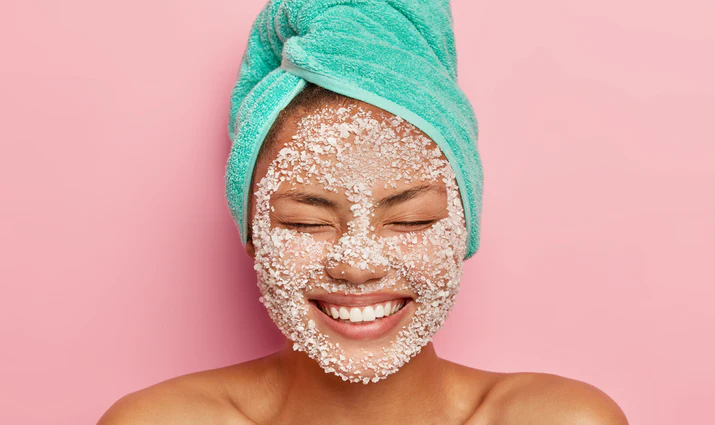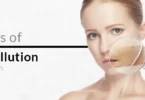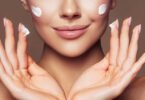
Overview
Exfoliating is one of the most essential parts of my skincare routine. This is one of the key ways I practically show self-love and attention to myself. In my routine, I do not joke with my exfoliating scrub and facial wash.
What exactly is Exfoliation?
Exfoliation is the removal of debris from the skin surface, in order words the removal of dead skin cells from the surface of our skin.
The process of removing these dead cells with tools or substances like a chemical, gritty substances, or exfoliation tool is called exfoliating.
Lack of exfoliation can lead to dry, flaky patches and clogged pores, which eventually can cause breakout on the face or itching skin.
What is chemical exfoliation?

This is simply the method of using different chemicals, such as hydroxy acids and retinol, with enzymes to renew your skin!
While DIY and OTC scrubs can help improve your skin’s appearance, chemical exfoliation can offer fast and more tremendous results.
Just as it is with physical exfoliation, chemical exfoliation can also irritate the skin if done incorrectly, in fact, cause severe damage to the skin.
If you are unsure about how to choose a chemical product for your routine, it’s best to see a dermatologist or other healthcare provider for proper guidance.
The AHAs (Alpha hydroxy acids)
Alpha hydroxy acids are a group of water-soluble (dissolvable) acids typically derived from sugary fruits. well, known Alpha hydroxy acids include:
- glycolic acid, which comes from sugar cane
- lactic acid, which is found in milk and pickled vegetables
- citric acid, found in citrus fruits
- tartaric acid, from grapes
- malic acid, found in apples
These acids help take off the surface of your skin so that new, and more evenly pigmented skin cells can generate and take their place.
Depending on the skin type, Alpha hydroxy acids may also help with:
- mild hyperpigmentation like age spots, melasma, and scars
- enlarged pores
- fine lines and surface wrinkles
- uneven skin tone
The BHAs (Beta hydroxy acids)
BHAs, on the other hand, are oil-based acids. These acids go deep into your hair follicles to dry out excess oils and dead skin cells to unclog your pores.
Because of its potential, BHA products are used to treat acne and sun damage.
The very common BHA is Salicylic acid. It is well known as an acne treatment, but it can also help calm general redness and skin irritation.
The Retinoids
Retinoids are a class of medications derived from vitamin A. They’re used to soothe sun-damaged skin, minimize signs of aging, and treat acne.
They work by protecting your skin from free radicals and promoting collagen production.
There are several topical retinoids available, including:
- retinol
- adapalene
- alitretinoin
- tretinoin
- bexarotene
- tazarotene
Retinoids vary in concentration. If OTC options aren’t working, talk to a dermatologist. They may be able to prescribe a stronger formula.
The Common Skin Type

There are various skin types, choosing the right exfoliating technique for your actual skin type will minimize the risk of irritation and help you obtain the best possible result.
Sensitive Skin Type
If your skin stings or is usually irritated after using new products, it’s considered sensitive. BHAs are typically less irritating than other chemical or physical exfoliants.
In most cases, sensitive skin might be a symptom of an underlying health condition. You should consider talking to a dermatologist or other healthcare provider before using new products if you have conditions such as eczema and rosacea.
Normal Skin Type
Normal skin is a clear and not easily irritated skin type. Most people who have “normal” skin find that they can try any exfoliating technique or product without experiencing adverse effects. It comes down to personal preference eventually.
Dry Skin Type
Dry skin is usually flaky or rough, sometimes not appealing. AHAs such as glycolic acid can help break through the surface layer of your skin, allowing your moisturizer to hydrate your new skin cells more effectively to give you the glow you need.
Oily Skin Type
Oily skin appears usually appears shiny and feels greasy. Most People with oily skin are often able to use stronger chemical and physical exfoliators, such as motorized brushes. Store-bought and DIY scrubs may also be a good option.
Combination Skin Type
The Combination skin type is a mix of oily and dry sections, or sensitive. You should focus on each area individually and alternate products as needed.
Your skin can be dry or normal in some areas and oily in others, such as the T-zone (nose, forehead, and chin). Many people have this type. It might need slightly different care in different areas.
Acne-prone Skin
If you are prone to breakouts or have mild-to-moderate acne, it is best to look out for products containing retinoids, salicylic acid, or glycolic acid. These are the products suitable for your skin.
Finally, whatever options you choose, be it DIY scrubs, OTC products, or seeking out professional treatments, depends on your individual skin care needs in the long run.
Although, if you have an existing skincare condition or are unsure about how to start, make an appointment with a dermatologist or other healthcare provider. They would be in the best position to walk you through your options and help you develop a skin care routine tailored for your individual goals and lifestyle.






